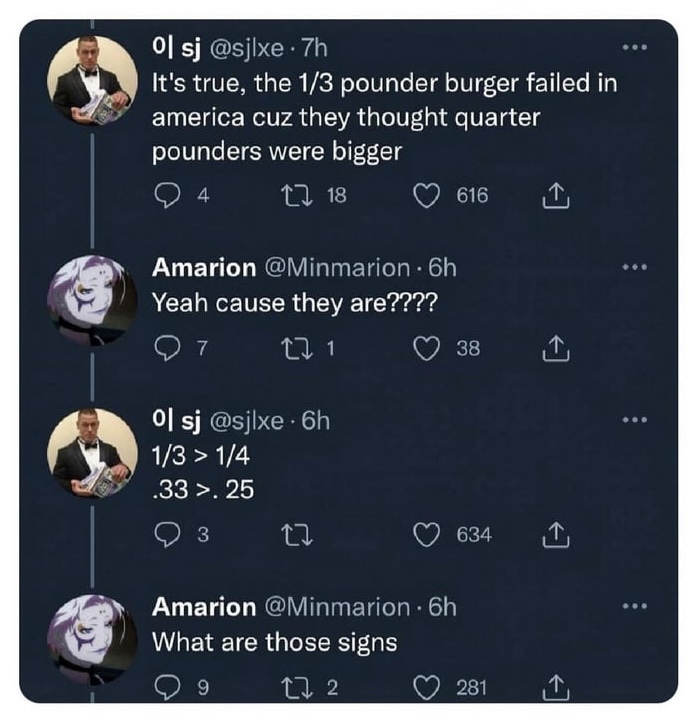this post was submitted on 14 Aug 2024
911 points (96.6% liked)
Facepalm
186 readers
1 users here now
Anything that makes you apply your hand to your face.
founded 6 months ago
MODERATORS
you are viewing a single comment's thread
view the rest of the comments
view the rest of the comments

It doesn't take a ton of mental capacity, but even though I have a good education in math, I still find myself doing the heuristics of assuming that larger digits means larger number. Using fractions for comparing sizes can flip these heuristics. And I think a lot of people are like me, and also that they won't spend a lot of time reading each item on the menu.
Where I'm from, burger sizes are just given in amount of grams, which makes it a lot easier to compare.
That's not heuristics, it's mental laziness or smoothbrain. You shouldn't say you have a good education in math and then say that...
It's indeed a form of mental laziness because the mind is designed to approach some concepts with a non-perfect optimization. That's heuristics. Yes, I can very easily see which number is the largest if I put my mind at it. But scanning over a fast food chain-sized menu, seeing numbers for 2, 4, 8, 12 piece nuggets, prices on different items and a 1/3 pound burger next to a 1/4 pound burger, I could easily see my mind skip the math and mess up the size comparrison.
Don't use language you don't understand, mate. Heuristic
I'm all up for being corrected if I'm wrong in my laguage somehow, but that article seems to be 100% in line with my understanding. What do you find to be wrong?
Like the article says in the first sentence, heuristics "is any approach to problem solving that employs a pragmatic method". Looking at fractions and assuming that the big number is larger is not a pragmatic method, it's a completely smoothbrain approach. I can't even comprehend how you think that's a good approach to fractions. It's just flummoxing.
I think we just disagree on the level something has to be to be considered "pragmatic". Almost all numbers we deal with in a daily basis are not fractions, so it's very natural to develop a shortcut to quickly look at digits to compare numbers. That is a practical approach.
Now, if you don't get too stuck on the word "pragmatic" but actually finish the sentence, you might find it to be more applicable.
Or maybe even look at the wikipedia page for heuristics from a psychological perspective:
https://en.m.wikipedia.org/wiki/Heuristic_(psychology)
Yes, I disagree that looking at a fraction and thinking "bigger number = larger number" is heuristic. It's just really extremely dumb and I can't even.
That's it. There's no argument, although you seem to think there is.
That's exactly it: heuristics are mental shortcuts. It's about avoiding the thinking part. No, I don't think that larger digits mean larger numbers in every case. But when scanning over multiple numbers without putting thought into it, it is a shortcut which works most of the time.
It's not fully logical. It might even be considered dumb. But that doesn't mean it doesn't fit the description of the word. That's just not how words work.
You seem to be ignoring the problem solving part. If it doesn't provide a response in the ballpark of the true solution it is not heuristic, it's just wrong line of thought.
No, it's the correct line of thought in most cases, as most numbers we work with on a daily basis are not fractions. This might be skewed differently in the US, but it's a solution which works in most cases. Heuristics are not necessarily perfect solutions and additional considerations need to be applied when they fail.
Heuristics is not most cases mate, get that through that thick skull of yours. Heuristic is about solving a problem, the problem in this case being "which of these fractions represents the largest number?".
Jesus fucking Christ on a toast!
You're discarding all the sources and arguments we're discussing, insulting me with childish language and throwing a hissy fit. I thought we had a reasonable discussion going, but this is obviously over.
Good day.
Finally.
If somebody uses a heuristic that’s flat-out wrong, is it no longer a heuristic?
I believe that's the jist of it. Heuristic is a way to get a roughly correct answer to a specific problem. If it doesn't provide a response that stays in the same ballpark of the real solution to the problem it's not heuristic, it's just a wrong train of thought.